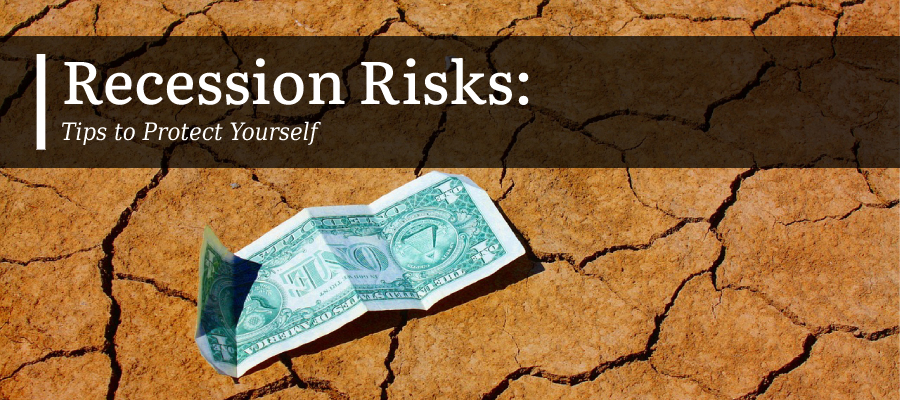Recession Risks: Tips to Protect Yourself
A recession can be a difficult and uncertain time for individuals and families. Widespread job losses, reduced income, increased debt, difficulty accessing credit, reduced access to healthcare, and increased stress and mental health issues are just some of the risks that individuals may face during a recession. If you have not been impacted by the current economic climate, hold on, because many economists suggest that the economy is about to take a turn. Let’s discuss these risks and talk about some simple things people can do to help protect themselves from a recession.
Loss of Employment
One of the most significant risks during a recession is the loss of employment. Widespread job losses can make it difficult for individuals to find and maintain employment, leading to reduced income and increased financial difficulties. To protect yourself from this risk, it’s essential to have a plan in place in case you lose your job. This can include building an emergency fund, networking, and developing new skills. Moreover, it is vital to retool and continually develop new skills. Continually learning and honing skills allows you to be more agile in this rapidly changing employment market.
Reduced Income
Even if individuals can find employment, their income may be reduced due to pay cuts or reduced hours. This can make making ends meet difficult and lead to financial difficulties. To protect yourself from this risk, it’s important to live within your means and have a budget. This can help you better manage your finances and ensure that your income is sufficient to cover your expenses.
Increased Debt
A loss of income can lead to financial difficulties and increased debt, which can be difficult to manage. To protect yourself from this risk, it’s important to be mindful of your spending and to avoid taking on new debt if possible. This can include cutting back on discretionary spendings, such as dining out or entertainment expenses, and paying off existing debt. In fact, you might want to check out my article discussing how you can strategize your debt.
Difficulty Accessing Credit
During a recession, lending standards may tighten, making it more difficult for individuals to access credit. This can make it difficult for individuals to make necessary purchases, such as buying a car or a home. To protect yourself from this risk, it’s important to maintain a good credit score and to avoid taking on new debt if possible.
Reduced Access to Healthcare
A loss of employment or income can lead to reduced access to healthcare, making it difficult for individuals to access necessary medical care. To protect yourself from this risk, it’s important to have health insurance in place and to look into alternative options, such as community health clinics, if necessary.
Increased Stress and Mental Health Issues
Financial difficulties and uncertainty can lead to increased stress and mental health issues such as anxiety and depression. To protect yourself from this risk, taking care of your mental health and seeking help if needed is important. This can include talking to a therapist or counselor, practicing mindfulness and relaxation techniques, and staying connected with friends and family.
Reduced Access to Housing
A recession can lead to reduced access to housing, as individuals may be unable to afford rent or mortgage payments. To protect yourself from this risk, it’s important to have a plan in place in case you cannot make your housing payments. This can include talking to your landlord or mortgage lender about alternative options, such as a payment plan or forbearance, and looking into government assistance programs.
Reduced Retirement Savings
A recession can lead to reduced retirement savings, as individuals may be unable to contribute as much to retirement accounts due to financial difficulties. To protect yourself from this risk, it’s important to have a plan in place for your retirement and to try to continue saving as much as possible, even during a recession.
Scams
Scammers may try to take advantage of individuals during a recession, offering false promises of financial assistance or employment opportunities. To protect yourself from this risk, it’s important to be wary of unsolicited offers and to research any opportunity or offer before providing personal information or money. Be especially cautious of emails or phone calls from people claiming to be government or financial institution representatives.
Social Isolation
Economic difficulties can lead to social isolation, as individuals may be unable to afford social activities or may be too embarrassed to participate in social events due to financial difficulties. To protect yourself from this risk, it’s important to stay connected with friends and family and to seek out free or low-cost activities that you can participate in. Joining a community group or volunteering can also be a great way to meet new people and stay connected with your community.
Indeed. A recession can be a difficult and uncertain time for individuals and families. With some economists suggesting that we are already in one, and with even more economists suggesting one is on the way (going to get worse), the time is now to start thinking strategically about your situation. The time to make the necessary changes is not when it is already too late.
By understanding the risks and taking steps to protect yourself, you can minimize the impact of a recession on your life. This includes having an emergency plan in case of job loss, budgeting, paying off debt, maintaining a good credit score, having health insurance, taking care of your mental health, having a plan in case of housing difficulties, saving for retirement, being aware of scams and staying connected with friends and family. It’s important to remember that while a recession can be difficult, it’s also an opportunity to reassess your finances and make changes that will benefit you in the long term.




